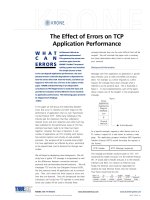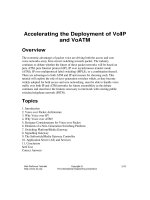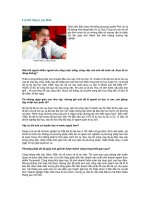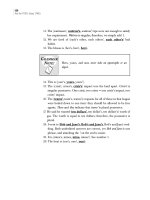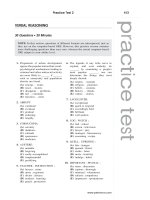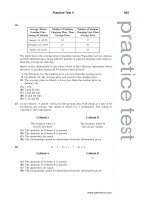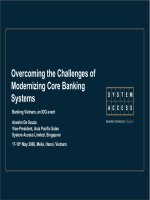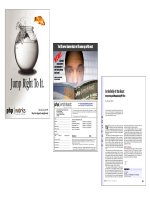Tài liệu PHP: The Good Parts: Delivering the Best of PHP- P9 pdf
Bạn đang xem bản rút gọn của tài liệu. Xem và tải ngay bản đầy đủ của tài liệu tại đây (509.99 KB, 16 trang )
phparch.com
The last must-have bookmark is the php|architect website. This is primarily a website
for promotion of the php|architect magazine, which is available in traditional paper
format as well as PDF format. This is a super technical magazine that has been in
publication for several years now. Full disclosure: I am a past editor for the magazine,
so I may be biased, but I can also speak to its high quality and excellent content. Apart
from publishing the magazine, the organization that runs it also usually hosts two PHP
conferences per calendar year. These conferences are great to attend and a good way
to meet lots of people in the PHP community. Getting back to the website, though, you
will find some excellent books, podcasts, and training materials. There is also an online
news thread that allows you to keep up on all the late-breaking news in the PHP world.
Figure 11-4 shows what the phparch.com home page looks like at the time of this
writing.
Figure 11-4. phparch.com home page
PHP/Web Conferences
A number of great PHP and web conferences are hosted each year all over the world.
In addition to the ones already mentioned (hosted by the php|architect folks), there is
a major one held each fall in California and hosted by Zend Corporation, known as
ZendCon. There are also many conferences held in Europe (England, Spain, and Ger-
many), South America (Rio), and Canada (PHP Quebec) that are worth looking into.
The best way to locate these conferences is to check out the conference listings page.
Here you will be able to see when conferences are and if there is an open call for pro-
Primary Websites | 143
Please purchase PDF Split-Merge on www.verypdf.com to remove this watermark.
posals. Feel free to submit a topic proposal; it’s always great to hear new and interesting
ideas from a broad range of speakers.
There are a vast number of other PHP resources out on the Web, in blogs, and in book
form. Take some time to look through some of the links that are offered on the websites
mentioned above and use your preferred search engine to help you find even more
resources. And in the true nature of the open source philosophy, be sure to share any
gold nuggets that you find.
144 | Chapter 11: Advanced Goodness
Please purchase PDF Split-Merge on www.verypdf.com to remove this watermark.
APPENDIX
The Bad Parts
PHP having bad parts is difficult to comprehend. After all, it is one of the most widely
used software development languages in the world. NASA, Wikipedia, Yahoo!, and
IBM, among others, all use it day in and day out for their critical data processing and
web development. In fact, it has been my opinion that PHP does not have any really
bad parts, just some potentially tricky areas to be aware of and work around.
However, after some deep soul searching, I came to realize that PHP is not perfect—
how could it be? It was created by humans (imperfect beings) and newer versions are
being produced all the time (with bug fixes included). Having said that, we will spend
the few remaining pages looking at the weaknesses (or perceived weaknesses) of PHP,
as well as ways to either work around them or avoid them altogether.
goto
The first item to discuss here is the inclusion of a
goto
statement in PHP version 5.3.
This is one of those items that, in my opinion, should only be used by those with enough
experience to not get themselves trapped in an infinite loop. As you may recall from
Chapter 10, there are a number of potential coding follies that you can get yourself into.
Nothing truly safeguards you against writing code similar to that shown in the following
listing:
landing15:
goto landing15;
Actually, PHP has an .ini s e t t i n g d i r e c t i v e t h a t w i l l s t o p a s c r i p t t h a t r u n s
too long with a default setting of 30 seconds—it’s called
max_execution_time
. If the time limit is exceeded, the guilty script is
terminated, so you won’t be able to cripple your server (but infinite
loops are certainly still something to try to avoid).
145
Download at Wow! eBook
Please purchase PDF Split-Merge on www.verypdf.com to remove this watermark.
This is indeed a potentially bad part of PHP, but only if you are inept enough to actually
write something like this. This is not really the fault of PHP. Again, we are looking at
an area of code writing that is at the mercy of the skill and logic of the programmer.
PHP gives you all kinds of rope, and it’s up to you as the developer not to hang yourself
(or others).
Function Naming and Parameter Order
As you may remember, PHP is an open source product. This means that it is written
and developed by many programmers all over the world. So it follows that there are
many cultures and spoken languages influencing the project. Mass confusion could
result, but there are balances and controls in place for the most part, and Zend is helping
to keep an eye on things. Still, there are many instances in the PHP language where
naming conventions are not followed consistently. For example, you will see some
internal functions named with an underscore, like var_dump or strip_tags, while others
will be continuous, like stripslashes and strpos. This can be a great annoyance for
sure, since you will undoubtedly be forced to look up function names to verify their
exact syntax, and not just a few times.
There is another level of inconsistency that can also trip you up: the position of the
parameters in string functions is the reverse of the parameters in array functions when
you are searching for content. If you look on the php.net website, you will see that the
online documentation refers to these parameters as $needle and $haystack. As an ex-
ample, the syntax for the strstr function is this:
strstr ( string $haystack , mixed $needle [, bool $before_needle = false ] )
And the syntax for the array_search function looks like this:
array_search ( mixed $needle , array $haystack [, bool $strict ] )
It is a bit of a hassle to try to keep this kind of information straight. Obviously, these
subsystems in PHP were written by different developers, or by one developer who forgot
what he was doing (also notice that one uses an underscore for the function name and
one does not—more potential confusion).
So the only real way to keep this all in order is to memorize the fact that array functions
want the needle parameter first and string functions want the haystack information
first, and one or both may or may not use an underscore.
This is one aspect of PHP that makes getting certified all that much more
valuable.
If you can pass the certification exam and keep this kind of
information straight, you should be a good candidate for a high-paying
development job!
146 | Appendix: The Bad Parts
Please purchase PDF Split-Merge on www.verypdf.com to remove this watermark.
Loose Typing
The next area that we will look at as a possible weakness of PHP is in the area of variable
data type declaration. PHP is loosely typed, which means you do not have to declare
the kind or type of data (integer, string, float, etc.) that will be stored in a variable. PHP
does its best to figure that out on its own. The alternative to this is called strong typ-
ing, in which a variable is “told” what kind of data it will hold at the moment of its
creation. For PHP code, you could use a variable called $notes and assign a string of
text to it and, on the very next line, store integer data into it. Although this may inject
bugs into your logic, PHP would be unaffected in how it processed the code.
Herein lies the issue: once a variable is “typed,” PHP can reassign its value, if so directed.
This can lead to confusion on the part of the developer, since the code has the potential
to change content. This can make code debugging and maintenance very difficult.
Some would argue the opposite, however, and say that this is an elegant way to manage
variables—let the code engine do the work and just let the developer create her mas-
terpiece (even if it may be difficult to maintain later). So, again, this is not necessarily
a bad part of PHP, but rather something to be aware of and adapt to when the need
arises.
Register Globals
The last topic to be discussed as a bad part is really only so because of a potential
security breach in its use. You can turn the register_globals directive on or off in the
php.ini file. In recent versions (4.2.0 and later), it is turned off by default. You can also
manage this setting within a running PHP script with the ini_set function.
register_globals is actually quite a timesaver and if it weren’t for the security hole, I
think it would be used much more widely. It creates variables in memory based on a
submitted HTML form. So, if you have a data entry form that asks for lastname and
firstname when the form is submitted (with register_globals turned on), variables
called $lastname and $firstname are automatically created for you on the subsequently
called page, with any entered data loaded into them for you.
The security flaw is that the PHP script is then open to data injection. If, for example,
a form is submitted with the GET action and it has an input with the name lname for last
name, someone can inject a value into that field through the URL address. This injection
can be bad data, malicious JavaScript code, or even some unwanted SQL commands.
If you are using a version of PHP prior to 4.2.0, make sure you either turn off this
directive (if you have the power to do so at the server level) or turn it off with the
ini_set function. If you can’t turn it off, be sure to avoid its use.
Register Globals | 147
Please purchase PDF Split-Merge on www.verypdf.com to remove this watermark.
register_globals is a deprecated directive and it will disappear from
PHP in the next full version release (version 6.0). The only reason it is
still available is for backward compatibility.
Is That All?
There may be other areas of PHP that people in the development community consider
to be “bad,” though, as I have stated earlier, it is really a matter of perspective and
experience. PHP is growing in strength, popularity, and use, and can only get better
and better over time.
Keep in mind that PHP is an open source programming language and that its improve-
ments are created by contributions from the user community. If you are interested in
getting involved with making PHP “bad part free,” be sure to get involved at http://www
.php.net.
148 | Appendix: The Bad Parts
Please purchase PDF Split-Merge on www.verypdf.com to remove this watermark.
